Related Research Articles

Yakshagaana is a traditional theatre, developed in Dakshina Kannada, Udupi, Uttara Kannada, Shimoga and western parts of Chikmagalur districts, in the state of Karnataka and in Kasaragod district in Kerala that combines dance, music, dialogue, costume, make-up, and stage techniques with a unique style and form. It is believed to have evolved from pre-classical music and theatre during the period of the Bhakti movement. It is sometimes simply called "Aata" or āṭa. This theatre style is mainly found in coastal regions of Karnataka in various forms. Towards the south from Dakshina Kannada to Kasaragod of Tulu Nadu region, the form of Yakshagana is called Thenku thittu and towards the north from Udupi up to Uttara Kannada it is called Badaga thittu. Both of these forms are equally played all over the region. Yakshagana is traditionally presented from dusk to dawn. Its stories are drawn from Ramayana, Mahabharata, Bhagavata and other epics from both Hindu and Jain and other ancient Indic traditions.

Pandit Mallikarjun Bheemaraayappa Mansur, was an Indian classical singer from Karnataka, an excellent vocalist in the khyal style in the Jaipur-Atrauli gharana.

Kota Shivaram Karanth, also abbreviated as K. Shivaram Karanth, was an Indian polymath, who was a novelist in Kannada language, playwright and an ecological conservationist. Ramachandra Guha called him the "Rabindranath Tagore of Modern India, who has been one of the finest novelists-activists since independence". He was the third writer to be decorated with the Jnanpith Award for Kannada, the highest literary honor conferred in India. His son Ullas is an ecological conservationist.
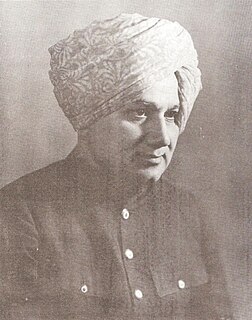
Narayan Shripad Rajhans, popularly known as Bal Gandharva, was a famous Marathi singer and a stage actor. He was known for his roles in female characters in Marathi plays, since women were not allowed to act on stage during his time.

Chandrashekhara Kambara is a prominent Indian poet, playwright, folklorist, film director in Kannada language and the founder-vice-chancellor of Kannada University in Hampi also president of the Sahitya Akademi, country's premier literary institution, after Vinayak Krishna Gokak (1983) and U.R. Ananthamurthy (1993). He is known for effective adaptation of the North Karnataka dialect of the Kannada language in his plays, and poems, in a similar style as in the works of D.R. Bendre.
Sri Idagunji Mahaganapati Yakshagana Mandali, Keremane (R)(Kannada: ಇಡಗುಂಜಿ ಮಹಾಗಣಪತಿ ಯಕ್ಷಗಾನ ಮಂಡಳಿ)or simply the Keremane Yakshagana Troupe is a Yakshagana troupe based in the Uttara Kannada district of Karnataka, India. It was started by Keremane Shivarama Hegde in 1934. He is an exponent of this art form and is the first Yakshagana artist to win the Rashtrapati Award, an award handed out by the President of India to people who excel in various fields. The troupe has survived three generations, with his children Shambu Hegde, Mahabala Hegde and Gajanana Hegde and his grand son Shivananda Hegde also being exponents of Yakshagana. Keremane Shivananda Hegde is the current director of the troupe and the institution.
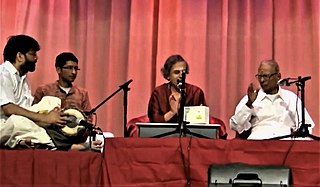
Rudrapatna Krishnashastri Srikantan, known as R. K. Srikantan, was a vocalist of the Carnatic musical tradition of South Indian music. He was awarded the Madras Music Academy's Sangeetha Kalanidhi in 1995.
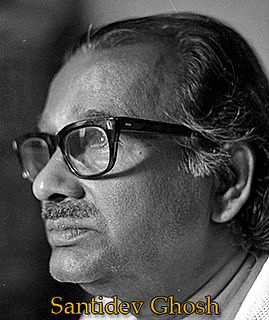
Santidev Ghose was an Indian author, singer, actor, dancer and maestro of Rabindra Sangeet.
Dr. Dattatreya Aralikatte, known in Karnataka as Datta is three time National Award winner and an Indian puppeteer and a teacher. He was born in Aralikatte village, in the Chikkamagaluru district of Karnataka, India, and resides in Bangalore, India. He heads the "Putthali Kalaranga", a well known traditional puppet theater group in India.
Kogga Devanna Kamath was an Indian artist who specialised in Yakshagana puppetry.

Naranappa Uppoor (1918–1984) was a famous bhagavath of Yakshagana art during 20th Century. He was much known for his voice, knowledge of tradition and heritage of Yakshagana. Dr. Shivarama Karanth, writer and his contemporary opined that Naranappa Uppoor is one person who is very familiar with the rich heritage of stage traditions. Only he can tell us what we had in the past and what we are losing.
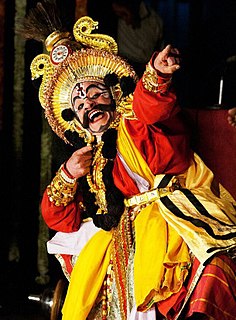
Chittani Ramachandra Hegde was a Yakshagana artist from Honnavara, Uttara Kannada, Karnataka. He was the first Yakshagana artist to be awarded the Padma Shri Award by the Government of India.
Surabhi is a family theatre group based in Hyderabad, Telangana, India. The group performs plays based on stories from Hindu mythology and the Puranas.
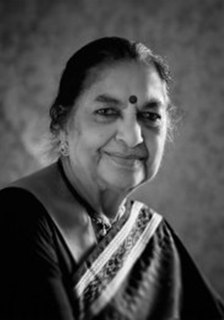
Maya Rao was an Indian classical dancer, choreographer and educator, in Kathak dance. She is known for her pioneering work in Kathak choreography, especially in dance ballets, and is credited for bringing Kathak, a North Indian-dance style to South India, when she opened her dance school, Natya Institute of Kathak and Choreography (NIKC) in Malleswaram, Bangalore in 1987. She was also the founder director of her dance company, "Natya and Stem Dance Kampni", an amalgam of NIKC and the STEM Dance Kampni based in Bangalore. After her early training under Guru Sohanlal of Jaipur Gharana, followed by Guru Sunder Prasad also of the Jaipur Gharana, and went to train under Guru Shambhu Maharaj of Lucknow Gharana at National Institute of Kathak Dance in Delhi.

R. Nagarathnamma (1926–2012) was an Indian theatre personality and the founder of Stree Nataka Mandali, an all-women theatre group based in Bengaluru. A recipient of the Sangeet Natak Akademi Award, she was honored by the Government of India, in 2012, with the fourth highest Indian civilian award of Padma Shri.

Kavungal Chathunni Panicker (1922-2007) was an Indian classical dancer, known for his proficiency in Kathakali, the traditional dance form of Kerala. He was an exponent of the Kavungal School of Kathakali, noted for its rigorous training methods and overt physical interpretation of abhinaya. He is known to have brought innovations to the dance form, especially in the decorative movements (kalasam) and his contributions are reported in the development of grammar and costumes for the Kavungal School. A recipient of the Sangeet Natak Akademi Award in 1973, Panicker was honored again by the Government of India, in 2006, with the fourth highest Indian civilian award of Padma Shri.
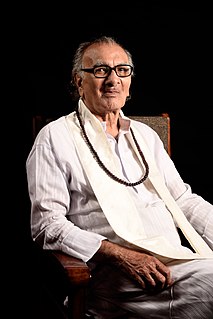
Jatin Goswami is an Indian dancer and choreographer, known as one of the prominent exponents of the classical dance form of Sattriya. He is the founder director of Sattriya Akademi, Guwahati, a sitting member of its Advisory Committee, and a former member of the General Council of the Sangeet Natak Akademi. He is also the founder of Alok Shilpi Sangha, a dance academy and Pragjyoti Kala Parishad, a cultural organization, and is a recipient of the 2004 Sangeet Natak Akademi Award. The Government of India awarded him the fourth highest civilian honour of the Padma Shri, in 2008, for his contributions to Sattriya dance.
Pransukh Manilal Nayak was an Indian Gujarati theatre actor, director, manager, and playwright from Gujarat, India. Born into a family of traditional theatre actors, he joined theatre troupes at a young age and rose to fame for his comic roles and female impersonations. His performances as a woman from Banaras in Kumali Kali and as Jivram Bhatt in Mithyabhiman were acclaimed. During his long career, he worked with many theatre companies and gave 22,455 performances, earning a listing in the 1989 Guinness Book of Records.
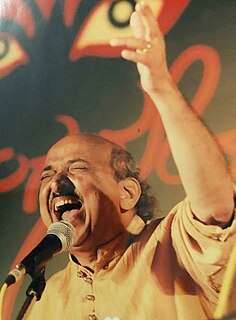
Pandit Parameshwar Hegde is an Indian Hindustani classical vocalist. He belongs to the Kirana, Gwalior and Patiala gharanas
Neela Ramgopal is a Carnatic vocalist and Carnatic music teacher from Tamil Nadu, India. She received several awards including Sangeet Natak Akademi Award and Sangita Kala Acharya Award by Madras Music Academy. Her biography Neela Ramgopal - A Musical Journey written by Harini Raghavan was published in 2015.
References
- ↑ "SRI IDAGUNJI MAHAGANAPATI YAKSHAGANA MANDALI (R) KEREMANE". SRI IDAGUNJI MAHAGANAPATI YAKSHAGANA MANDALI (R) KEREMANE. Retrieved 13 March 2016.
- ↑ List of Sangeet Natak Akademi awardees Archived 2012-02-17 at the Wayback Machine
- ↑ "Keremane Shivarama Hegde". yakshagana-keremane. Retrieved 10 September 2020.
- ↑ "Keremane Shivarama Hegde". yakshagana-keremane. Retrieved 10 September 2020.